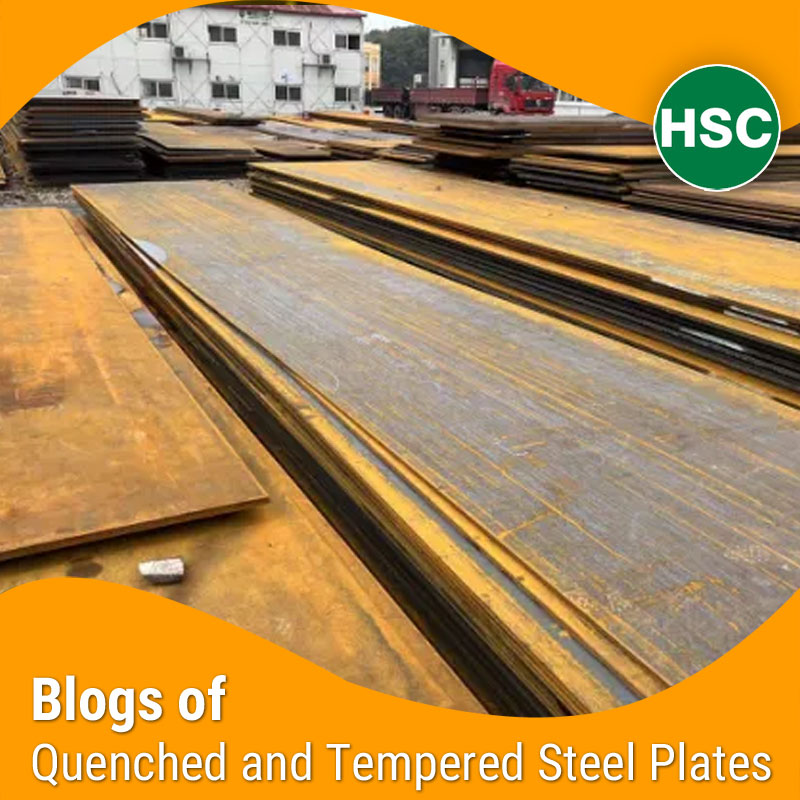Yes, Quenched and Tempered (Q&T) steel plates like S690QL, S890QL, S960QL, A514, and others can be welded and bent.
But due to their high strength and low ductility, you must follow strict procedures — otherwise, cracking or hardness loss may occur.
Think of it this way:
Regular steel = soft clay to shape.
Q&T steel = springy metal strip — bendable, but only with care.
Why This Matters to You
Whether you’re building a crane boom, defense part, trailer chassis, or structural frame, you’ll likely need to cut, weld, or form your Q&T plates. That’s when understanding their behavior can save your project from costly failures.
What Happens If You Weld or Bend Q&T Steel Incorrectly?
- Cracks at weld edges
- HAZ (Heat-Affected Zone) hardness drop
- Plate warping or failure under load
- Reduced yield strength or lifespan
So yes, it’s possible — but never freestyle it. Use guided processes and approved consumables.
Can You Weld Q&T Plates Like S690QL or A514?
Yes — but carefully.
Q&T plates can be welded, provided you follow precise procedures. Their hardness and strength come from a controlled heat treatment — so careless welding can undo that.
Welding Guidelines:
- Use Low-Hydrogen Electrodes: E7018 or equivalent
- Preheat Requirements:
- For <30mm thickness: ~100–120°C
- For >50mm: up to 150–200°C
- Interpass Temperature Control: Keep <250°C
- Post-Weld Heat Treatment: Usually not needed — but stress relieving may be recommended for critical components
- Edge Preparation: Use proper beveling for full penetration
Welding S960QL or A514 Grade Q requires even tighter thermal control than S690QL.
Can Q&T Plates Be Bent or Formed?
Yes, but not like mild steel.
Due to their high yield strength, Q&T plates like S690QL or Dillimax 690T can be bent, but only within a limited radius and under warm conditions if needed.
Bending Tips:
- Min. Internal Radius: Usually ≥ 3x plate thickness (varies by grade)
- Bend Direction: Always bend perpendicular to rolling direction
- Edge Cracking: Avoid sharp tools or dry bending on cold days
- Warm Bending: Heating up to 100–150°C may reduce risk on thick plates
- Back-up Tooling: Use smooth die radii with strong backup plates
Avoid bending S960QL or HITEN 980LE in cold conditions — it may lead to cracking due to higher hardness.
Key Mistakes to Avoid
- Welding without preheat
- Using basic electrodes on high-strength steel
- Bending close to bolt holes or weld seams
- Rolling or pressing Q&T plates without checking specs
- Assuming it behaves like mild steel or IS 2062
Real-Life Use Cases Where Welding/Bending Works Well
- Trailer floor plates – Plasma cut + weld + slight curvature
- Crane arm base – CNC cut + multi-pass welding
- Bucket sides or dumpers – Press brake bent, stress-relieved
- Bridge plates – Welded flange + bolted connection compatibility
With the right prep, Q&T steel can outperform even alloy steels in structural use.
How to Choose the Right Grade for Weldability and Bendability
If you plan to weld and bend during fabrication, here’s a quick guide:
| Application | Suggested Grade | Reason |
|---|---|---|
| General fabrication (easy forming) | S690QL | Best balance of strength and ductility |
| Complex weldments (multi-pass) | A514 / HIND Q&T | Familiar to many fabricators |
| Thin-wall high-performance builds | S960QL | Great strength but needs welding control |
| Forming + edge punching | HITEN 780LE | Japanese steel with better cold workability |
Tip: The higher the strength, the harder it is to form or weld without cracking — so plan your grade based on design complexity and team skill.
Expert Advice for First-Time Users
If your team is new to Q&T plates:
- Start with S690QL – it’s easier to fabricate
- Get a welding procedure qualification record (WPQR)
- Request pre-cut and beveled parts from your steel supplier
- Use trial pieces to test forming radius and settings
- Work with a steel dealer who provides MTCs + support
Remember: It’s not just about the plate — it’s about how well your team handles it.
SEO + Voice Search FAQs
Can Q&T steel be welded safely?
Yes, with proper preheating, low-hydrogen electrodes, and thermal control.
Can I bend S690QL or S960QL plates?
Yes, but you must follow minimum bend radius guidelines and avoid cold cracking.
Is preheat always required for welding quenched and tempered steel?
Not always, but it’s highly recommended, especially for thicker sections.
Can Q&T plates crack while bending?
Yes, if done without checking radius limits, direction, or surface prep.
What is the best grade of Q&T plate for welding and forming?
S690QL and HITEN 780LE are among the most fabrication-friendly.
Do you need post-weld heat treatment for Q&T plates?
Not usually, but may be required for highly stressed or code-specific parts.
What tools are best for cutting Q&T plates?
Use CNC plasma, waterjet, or laser — avoid thermal distortion without edge prep.
Can I roll Q&T plates?
Only within controlled limits — and after checking specs or doing warm rolling.
Do you offer cut-to-size and pre-beveled Q&T plates?
Yes, Hindustan Steel offers CNC-cut, weld-prepped Q&T plates.
Is MIG welding suitable for Q&T plates?
Yes, if filler wire is matched to plate strength and controlled parameters are used.

